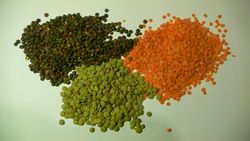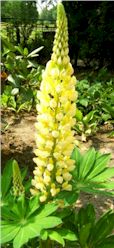|

Lentil |
Among the leguminous plants which supply food for the invalid, and are endowed with certain qualifications for correcting the health, may be justly placed the Lentil, though we have to import it because our moist, cold climate is not favorable for its growth. Nevertheless, it closely resembles the small purple vetch of our summer hedgerows at home. In France its pulse is much eaten during Lent--which season takes its name, as some authors suppose, from this penitential plant.
Men become under its |
subduing dietary influence, "lenti et lenes." The plant is cultivated freely in Egypt for the sake of the seeds, which are flat on both sides, growing in numerous pods.
The botanical name is Ervum lens; and about the year 1840 a Mr. Wharton sold the flour of Lentils under the name of Ervalenta, this being then of a primrose color. He failed in his enterprise, and Du Barry took up the business, but substituting the red Arabian Lentil for the yellow German pulse.
Joseph's mess of pottage which he sold to Esau for his birthright was a preparation of the red Lentil: and the same food was the bread of Ezekiel.
The legumin contained in this vegetable is very light and sustaining, but it is apt to form unwholesome combinations with any earthy salts taken in other articles of food, or in the water used in cooking; therefore Lemon juice or vinegar is a desirable addition to Lentils at table. This is because of the phosphates contained so abundantly, and liable to become deposited in the urine. "Lentils," says Gerard, "are singular good to stay the menses." They are traditionally
regarded as funeral plants, and formerly they were forbidden at sacrifices and feasts.
Parkinson said, "The country people sow it in the fields as food for their cattle, and call it 'tills', leaving out the 'lent', as thinking that word agreeth not with the matter." "Ita sus Minervam." In Hampshire the plant is known as "tils," and in Oxfordshire as "dills." The Romans supposed it made people indolent and torpid, therefore they named the plant from lentus, slow.
|

Lupine |
Allied to the Lentil as likewise a leguminous plant is the Lupine, grown now only as an ornament to our flower beds, but formerly cultivated by the Romans as an article of food, and still capable of usefulness in this capacity for the invalid. Pliny said, "No kind of fodder is more wholesome and light of digestion than the white Lupine when eaten dry." If taken commonly at meals it will contribute a fresh color and a cheerful countenance. When thus formerly used neither
trouble nor expense was needed in sowing the seed, since it had merely to be scattered over the ground without ploughing or digging. But Virgil designated it tristis Lupinus, "the sad Lupine," probably because when the pulse of this plant was eaten without being first cooked in any way so as to modify its bitter taste, it had a tendency to contract the muscles of the face, and to give a sorrowful appearance to the countenance. It was said the Lupine was cursed by the
Virgin Mary, because when she fled with the child Christ from the assassins of Herod, plants of this species by the noise they made attracted the attention of the soldiers. |
The Lupine was originally named from lupus, a wolf, because of its voracious nature. The seeds were used as pieces of money by Roman actors in their plays and comedies, whence came the saying, "nummus lupinus," "a spurious bit of money."
Herb Simples
The Primitive Simplers presented here show the way of life in other generations, it is not suggested or recommended trying them yourself. |
|
Garden
Herbs
Home
History of Herbs
Herb Gardening
Herbs for Beginners
Drying & Preserving Herbs
Indoor Herb Gardening
Herb Garden
Hints & Tips
Herbal
Cooking
Herb Chart
Using Herbs
Culinary Herbs
Herb
Oil and Vinegar
Herb Teas
Herb Candy
Herb Jelly
Herb Simples
Preface
Introduction
Alphabetical Listing

Trade
Recipes Online
Share your Recipes with others!!
|



